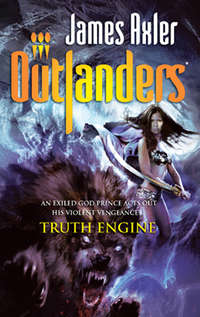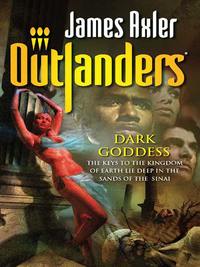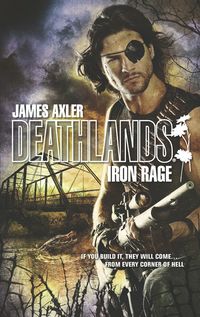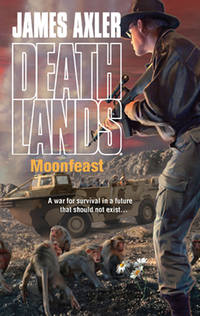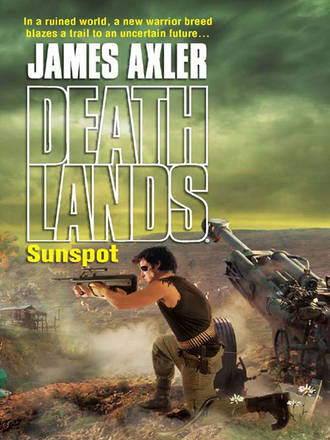
Полная версия
Sunspot

Sunspot
Death Lands®
James Axler

www.mirabooks.co.uk
Contents
Chapter One
Chapter Two
Chapter Three
Chapter Four
Chapter Five
Chapter Six
Chapter Seven
Chapter Eight
Chapter Nine
Chapter Ten
Chapter Eleven
Chapter Twelve
Chapter Thirteen
Chapter Fourteen
Chapter Fifteen
Chapter Sixteen
Chapter Seventeen
Chapter Eighteen
Chapter Nineteen
Chapter Twenty
Chapter Twenty-One
Chapter Twenty-Two
Chapter Twenty-Three
Chapter Twenty-Four
Chapter Twenty-Five
Chapter Twenty-Six
Chapter Twenty-Seven
Chapter Twenty-Eight
Chapter Twenty-Nine
Chapter Thirty
Chapter Thirty-One
Chapter Thirty-Two
Chapter One
Ryan Cawdor stood out of the line of fire, his back pressed against a mud-brick wall. The ground was partially frozen underfoot, the early morning sky streaked with scudding low clouds. Gusts of wind shrieked through the ramshackle hilltop maze of Redbone ville, drowning out the screams of the dying.
A makeshift barricade of rocks and dirt and tree limbs stood less than one hundred feet from Ryan’s position. It blocked the entrance to a narrow path that was the ville’s only remaining escape route. The blue-less sights and muzzles of three AK-47s poked out through firing ports, gaps in the layers of piled debris.
From the opposite direction, near the center of the pesthole ville, a frantic flurry of gunshots rang out. With black powder revolvers and remade single-shot 12-gauges, Redbone’s trapped residents fought off a superior force. The resistance was answered by short, efficient bursts of heavy-caliber autofire.
Time was running out, for all concerned.
Ryan stepped from cover, his scoped Steyr SSG-70 longblaster slung over his shoulder, a SIG-Sauer P226 semiautomatic blaster securely holstered under his left armpit. With empty hands in plain view, he advanced up the rutted path, past a rude stock pen on his right, toward the waist-high, twelve-foot-long barricade. A blast of wind scoured the frosty earth, whipping up the stench of pig manure. The pigs themselves were nowhere to be seen, but mounds of loose droppings lay scattered over the track.
The worn AK sights held steady on his chest as he closed the distance, walking straight into the maw of a firing squad. Fifty feet. Forty feet. The adrenaline coursing through his veins made his fingertips tingle and his scalp crawl. The empty socket of his left eye began to itch like a rad bastard under its black patch. The sensation spread along the jagged welt of scar that split his brow and cheek. Ryan didn’t scratch. He kept his hands in sight, well away from his body.
“Stop there!” someone shouted from behind the barrier.
Ryan kept walking, spreading his arms wide, displaying open palms in a gesture of surrender.
“Stop or you’re dead!”
Ryan was betting they wouldn’t shoot unless he made a move for his blasters. Baron Malosh paid his press gangs by the head. The live head. This crew’s job was to capture or to turn back any ville folk trying to escape conscription into the baron’s army. To Malosh even a one-eyed man had value, if only as cannon fodder.
“Stop!”
“I give up,” Ryan said as he continued forward. “You win. Take my weapons…”
“Get on your belly! Now!”
“No way am I going to lie facedown in pig shit,” Ryan shouted back. Though his words and tone were defiant, as he advanced he raised his hands even higher. “I said you could take my blasters.”
Ryan was five yards from the barricade when the baron’s men realized they had a problem. The man was tall and broad across the shoulders, and the closer he came to the narrow path entrance with arms spread, the more he blocked their view—and their ability to control the entire kill zone. To see around him, to see what was coming directly behind him, they had to move to the side and stand from cover. This they did more or less in unison.
As the men jumped up, Ryan dived to the dirt in front of the barrier, leaving them exposed to incoming fire.
At once, tightly clustered blaster shots and the canvas-ripping clatter of an Uzi rang out from behind him. The volley of slugs whined a yard above his head, thudding into wood, ricocheting off rock and smacking flesh.
The burst of blasterfire lasted no more than three seconds. Ryan pushed up from the ground and, drawing his SIG from shoulder leather, vaulted the barricade, leaping into the tight, shanty-lined lane.
All three of Malosh’s men were down.
Over the sights of his SIG, Ryan quickly checked the fallen for signs of life. Overlapping layers of worn duct tape held the soles and tops of their boots together. They wore no insignia or badge of rank. Their bearded faces and gloveless hands were encrusted with layers of grime. Only one was moving, his legs mule-kicking spastically. His skull had been cratered by multiple bullet hits, front and side; gobs of steaming brain matter clung to the coarse mud wall.
No follow-up shots required.
Ryan raised his weapon in a two-handed grip and surveyed the alley. The tight passage was like a wind tunnel; he squinted his good right eye as grit peppered his face. On either side of the dirt lane, a dozen one-room shanties shared common earthen walls and corrugated metal roofs. The crooked, doorless entryways faced one another, raising the possibility of a nasty, close-range cross fire. Two-thirds of the way down the path, a huge dead hog lay on its side in a pool of blood. Through the gap at the far end of the alley, Ryan saw distant blue mountains bathed in bright sunlight, beyond the edge of the coming storm. Because of the elevation and the angle of view, he couldn’t see the cultivated fields around the hilltop’s base, or the border where they gave way to desert scrubland. For generations, the area’s farmers had retreated to higher ground for their common defense. The fortified ville had easily held off bands of predatory muties and coldheart robbers. Against a large, well-trained and equipped military force, however, Redbone was a sitting duck.
Ryan took a quick glance over his shoulder to check on his companions, who were charging toward him.
Jak Lauren ran in front in long, loping strides, his .357 Magnum Colt Python in his fist. Jak’s face was bloodlessly white, his long, lank, platinum hair streamed back from his head. As the albino ran, his ruby-red eyes scanned the doorways and rooftops of the wall-to-wall huts for enemy snipers. Following hard on his heels, puffing from the effort, was John Barrymore Dix. The bespectacled Armorer gripped his Uzi machine pistol in both hands, his shoulder-slung, Smith & Wesson M-4000 12-gauge pump slapped wildly against his back. His prized fedora was screwed down on his head to keep it from blowing off.
Behind J.B. were two women with revolvers drawn, running shoulder-to-shoulder. In a shaggy fur coat and Western-style boots was tall, red-haired Krysty Wroth, Ryan’s longtime lover and soul mate. By her side, the short black woman in a patched, milspec parka was Dr. Mildred Wyeth, whom Ryan and the others had awakened from a hundred-year cryosleep. Both women carried .38-caliber weapons. Krysty’s blaster of choice was a Smith & Wesson 640. Mildred’s was a Czech-made ZKR 551, the same make and model of firearm she had used to take a silver medal in the last-ever summer Olympic Games.
The world of big-time international sport had ended along with everything else more than a century before, on January 20, 2001. The true causes of Armageddon were lost in the seething, global hellfire of the all-out Soviet-U.S. nuclear exchanges that had occurred on that fateful day. On January 21, 2001 there was no one left to spin the blame for the ultimate catastrophe, to fume and sputter over whose half-trillion dollars’ worth of missile defense equipment had malfunctioned first, over who was the aggressor and who the victim. A handful of scattered human survivors had inherited a ruined earth, a disrupted and lethal ecology, an utterly destroyed civilization. With no political entity left to blame for their tragic circumstances, they turned on science, itself. Those who had once proudly worn the uniform of that discipline, the whitecoats, were the target of their deepest and most abiding hatred.
Bringing up the rear of the formation, the tails of his waistcoat flapping as he sprinted in cracked knee boots, was Dr. Theophilus Algernon Tanner. Of the six companions, the tall, scarecrow-like Tanner had the most cause to despise the scientists. Whitecoats from ultrasecret Operation Chronos had trawled him forward from the year 1896 to 1998, ripping him from his life in Omaha, Nebraska, from his wife Emily and his children, Rachel and little Jolyon. In isolated laboratories, researchers had experimented on him for long months, and then they had hurled him blindly into the future; this to rid themselves of his truculent Victorian carcass and as payback for his lack of cooperation. That the hurling had happened only weeks before nukeday was just more of Doc’s bad luck. Instead of dying in the conflagration of January 20th, and reuniting with his loved ones in heaven, he had been transported ninety-some years forward in time.
To hell.
In his left hand Doc carried a silver-handled, ebony swordstick, which counterbalanced the considerable mass and weight of the firearm he held in his other hand. The black powder LeMat was a relic. Its short, .63-caliber underbarrel was designed for “blue whistler” scattershot and close-range mayhem—the Civil War’s version of a “room broom.” The LeMat’s five-and-a-half-inch top barrel fired .44-caliber lead balls from its revolver cylinder.
Behind Doc, Ryan saw black smoke begin to pour from the roofs of the jumble of low buildings at the center of the ville. The baron’s press gangs were burning out Redbone ville’s draft resisters.
As he turned back to the alley, a short man leaned out of a doorway on the right, AK shouldered and ready to rip. Ryan didn’t pause to verify allegiance or intent. He opened fire first, punching four 9 mm slugs into the chest and neck of the would-be shooter. The man groaned and fell back through the doorway, dropping the AK across the threshold as he went down. His boots stuck out over the threshold, their silver-tape-wrapped toes pointing skyward.
“Help! Please!” someone called from the shanty.
Others inside took up the desperate cry. “Help! Help us!”
Ryan stood his ground, covering the lane until his companions had jumped the barrier and joined him. On his signal, they advanced quickly and quietly, leapfrogging and clearing the doors on either side as they went. The closer they got to the shanty where the dead man lay, the louder and more frantic the shouting became.
Ryan signaled for Jak, Krysty and Doc to continue sweeping the alley for more of Malosh’s crew. Then he stepped over the body and entered the hut, with J.B. and Mildred behind him. The low-ceilinged gloom reeked of fear-sweat and pig muck. Five people sat on the earthen floor, their hands tied behind their backs, their knees drawn up, ankles bound together. Two of the men and the sole female were in their late teens or early twenties, dressed in homespun cloth. One of the men had a crusted-over, bloody head wound; the other had a badly bruised left eye. There was straw and dried dung in the woman’s long, coarse blond hair, and her lower lip was split and swollen.
The other two male captives were trussed back to back. Their clothes were layers of filthy rags. One was in his late fifties with a deeply weather-seamed and pitted face, and wild salt-and-pepper hair and whiskers. The man tied to him was less than half his age and half again his size, bootless, barrel-chested, his pattern-bald hair shaved to stubble, with an oddly smooth and doughy baby face.
“Cut us free,” the woman said to Ryan. When he made no immediate move to do so, she shrilled at him, “We’re Redbone folk, born and bred. We’re on the same side as you. Otherwise we wouldn’t be tied up like this.”
“If you don’t let us go,” the man with the bruised eye pitched in, “Baron Malosh will force us to fight his stinking wars. Free us and we’ll fight against him, here and now.”
“We’ll take back our ville,” the woman declared.
Ryan gave her a dubious look, but unsheathed his panga and with deft strokes severed all their bonds.
“You know you can’t possibly win,” Mildred told the quintet as they rose to their feet. “Come with us, away from here.”
“We won’t abandon our land,” the man with the head wound said. “Our kin have been here since nukeday.”
“We don’t have time to argue with you,” Ryan said. “You can do as you please.”
The young woman snatched up the AK from the threshold. “If you fight alongside us,” she said, “we have a chance.”
J.B. succinctly stated the companions’ position on the matter. “Not our ville,” he told her.
“There are three more AKs outside,” Ryan said. “You can hold off the baron’s gang from behind the barricade. Wait until they get close before you open fire…”
Ryan spoke the last words to the trio’s backs as they rushed out the door.
“What about you two?” Mildred asked the remaining men. “Are you staying to fight?”
“The fight’s already lost,” the older one said. “If we stay, the baron’s men will catch us. We’ll take our chances with you.”
“What are your names?” Mildred asked.
“He’s Young Crad and I’m called Bezoar.”
“This is going to be a foot race,” Ryan warned them. “No telling how far we’re going to have to run to get clear of Malosh. If you can’t keep up with us, you’ll get left behind. We won’t let you slow us down, and we won’t risk our lives to save yours. Do you understand?”
Bezoar nodded, grimacing at the news. Young Crad stared back. Not sullen. Not fearful. Not shell-shocked. If anything, he seemed mildly tickled by Ryan’s little speech. The grizzle-bearded man pushed his large friend out into the alley, ahead of Ryan and the others.
When Young Crad saw the dead black-and-white hog lying in the lane, he broke free of the smaller man’s grip. He raced to the side of the gutshot animal, dropped to his knees and unleashed a piercing cry of anguish.
Bezoar ran to catch him, limping hard on a right leg that didn’t bend at all at the knee. “She’s gone, boy,” he said. “It’s a nukin’ pity and a rad-blasted waste but there’s nothing more we can do for the old girl. Buck up, now, we’ve got to go…”
“Move!” J.B. growled.
Young Crad looked up, his eyes streaming tears. “Piggie dear, piggie dear,” he moaned. His chin quivered uncontrollably as he stroked the bullet-riddled hide.
Bezoar grabbed his friend by the shoulders and gently but firmly dragged him from the corpse and pulled him up the lane.
“A gimp and a triple-stupe droolie,” J.B. said, shaking his head. “They aren’t gonna last half a mile, Ryan.”
Such was the harsh reality of Deathlands. It was a place where the bloody bones of the weak nourished the strong. That these swineherds had lived as long as they had was a minor miracle.
Soon to end.
“I reckon it’s their choice where they want to die,” Cawdor said.
Jak, Krysty and Doc waited at the far end of the lane. The Redbone folk they’d rescued were already manning the barricade, covering their rear with the captured predark assault rifles.
The other hovels were deserted. Mebbe the residents had made it out. Mebbe not. Just beyond the last of the tumbledown dwellings, the alley ended abruptly at the edge of a nearly sheer, three-hundred-foot cliff. Redbone ville was laid out like a medieval castle town. The ville’s buildings clung to and jutted up from the hilltop, extensions of the vertical bedrock. From the alley’s terminus, a rough zigzag path led down the cliff face to the gridwork of cultivated fields below—beyond them a bleak desert panorama stretched to the blue mountains on the horizon. There was no sign of a rear guard on the plain. Malosh had apparently committed his entire force to a surprise attack.
Krysty took in the unarmed swineherds, then looked at Ryan with concern. Her prehensile mutie hair had already drawn into tight curls, an automatic response to the mortal danger they faced.
He anticipated her question. “They know they’re excess baggage,” he said. “Let’s get out of here.”
Jak jumped onto the trail and led the rapid descent. As the companions skidded single file to the bottom, thunder rumbled in the distance. Bolts of lightning shot through the northwestern sky that had turned black as night. It was at least twenty degrees warmer down on the plain, and the wind had acquired a strange, unpleasantly humid edge.
“Could be a chem storm,” Krysty said. “A bad one.”
“It’s going to come down on us hard,” Mildred said.
“And shortly, it would appear…” Doc added. “Perhaps we should consider seeking shelter until it passes?”
“No time for that, now,” Ryan said. “We have to get out of longblaster range before the baron’s men spot us and pin us down. You take the point, Jak. Cut through the fields, then follow cover to the southeast, away from the storm front. Double-time it. No stops.”
With the albino wild child in the lead, they broke from the base of the hill and ran into the rows of Cradding cabbages and knee-high potato plants. There were no farmers’ bodies lying about. Malosh’s army had closed in during the night and had attacked at first light.
As they neared the edge of the fields, autofire roared from the hilltop behind them. The mad clattering sawed back and forth. It sounded as though the folks manning the barrier were giving as good as they were getting.
The companions were about seven hundred yards from the base of the hill when they heard a string of sharp booms—multiple gren detonations, not thunderclaps. As the echoes of the explosions faded, blasterfire ceased.
The barricaded alley had fallen, and with it, Redbone ville.
Jak picked up the pace and Ryan and the others matched it. The desert hardpan was much easier to run on than soft, cultivated earth. A warm tailwind, now driving and steady, pushed against their backs.
The albino led them down into a shallow gully and they followed it, running as low to the ground as they could. The ditch wasn’t deep enough to completely conceal them, but the chaparral and scrub along its lip broke up and blurred their silhouettes. They drew no sniper fire from the ville, either because they hadn’t been seen or because they were already out of range.
The discomforts of the forced march were all too familiar to them—the bonfires burning in lungs and legs, the jarring impacts on hip joints and knees, the rhythmic rasp of breath in the ears. The two swineherds had managed to keep up so far. Bezoar hip-hopped along, red-faced, his hair matted with sweat, arms flailing for balance. Barefooted Young Crad moved easily beside him with a powerful, lumbering gait.
Fourteen hours ago, on the previous evening, the companions had arrived in Redbone after a long trek south. They had planned on trading part of their stock of centerfire bullets for food and water this morning; instead they had had to expend them making their escape. The breakout was nothing Ryan and the others were ashamed of. Hard-bitten realists, they knew there were things they could fight and things they could not.
None of them had any firsthand knowledge of Baron Malosh. What little information they possessed came from tales they’d heard in gaudy houses and around communal campfires along their route. In Deathlands, stories of barbarism and savagery were taken in along with mother’s milk, this to prepare the young for the inescapable facts of life. Exaggerations, misconceptions, distortions and outright lies were expected—even honored—in a dark, misbegotten place where ignorance and chaos ruled. If a tenth of the gossip the companions had heard about Malosh was true, he was an utterly ruthless marauder, and a formidable adversary.
It was said that he had carved a kingdom out of nothing. His own homeland was shit poor, with little water and fertile soil, barely able to support its population. He made up the difference with hit-and-run campaigns against the unprotected borders of richer neighboring barons. Malosh kept his ragtag army in constant motion, resupplying it through looting and pillage, replacing dead fighters with conscripts—norms and muties, male and female. He enforced military discipline with an iron hand. The only way a person left Malosh’s service was on the last train west. When he conquered a ville like Redbone, he took away most of the food and most of the able-bodied residents. According to the campfire tales, he always left behind a little to eat and a few breeders; and of course, the old folk and very young children useless in battle. He left sufficient living souls and resources for the ville to eventually recover, albeit with terrible hardship, this so he could prey on it again when the need arose.
The gully widened as it emptied into a much broader channel. The dry riverbed was cut with deep rills and dotted with scrub-covered islands. Jak took them along the near bank, an undercut bluff six feet high.
Ryan brought up the rear, running in grim silence, conserving his energy. Sweat peeled in a steady trickle down the middle of his back. He could sense the storm front rapidly overtaking them. The static charge in the air made the hair on his arms and neck stand erect, the smell of ozone grew thicker and thicker. They were about a mile from the ville when he shouted to Jak, calling a halt to the column’s advance.
The company stopped, but Bezoar was the only one to actually sit down, and he did so hard, on top of a boulder.
“Time for a quick recce to check for pursuit,” Ryan said. He waved for J.B. to follow, then started to climb up the side of the bluff, using exposed roots and embedded rocks as hand-and footholds.
“Mebbe they won’t come after us?” Bezoar suggested.
“If they saw us running away, they’re coming,” Krysty told him. “Eight live recruits are worth plenty to Malosh. Not to mention him wanting payback for the men we chilled.”
As Ryan and J.B. topped the bluff, puffs of dust started kicking up around them. Not from incoming longblaster bullets. From a spitting, widely spaced rain. The drops falling on Ryan’s face and hands felt tepid and slightly greasy, but they didn’t burn like holy nukefire. It wasn’t the caustic, flesh-melting variety of chem rain.
J.B. pulled out a battered pair of compact binocs and looked back toward Redbone. “Men on horseback, coming down the cliff trail,” he said. “Pack of dogs running with them.”
“Let me have a look-see,” Ryan said, taking the binocs.
“I counted a half-dozen horsemen,” the Armorer told the others.
“There’s twice that many dogs,” Ryan said. “Damned big ones.”
“By the Three Kennedys, it’s a foxhunt!” Doc exclaimed. “The dogs will pick up our scent and the horses will run us to ground in no time.”
Ryan turned the binocs to the northwest horizon, where chain lightning flashed again and again through a curtain of black. Below the cloud bank, a torrential downpour obscured his view of the plain.
“Bastard heavy rain is bearing down,” he said. “It’ll cover our footprints and wash away our scent.”
“Baron’s men can see that, too,” Krysty said. “They’re going to come at a dead gallop.”
“We’re in a flood plain here,” Mildred reminded everyone. “We need to find ourselves some higher ground.”



